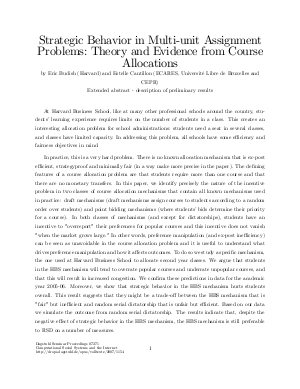Strategic Behavior in Multi-unit Assignment Problems: Theory and Evidence from Course Allocations
Authors Eric Budish, Estelle Cantillon
-
Part of:
Volume:
Dagstuhl Seminar Proceedings, Volume 7271
Part of: Series: Dagstuhl Seminar Proceedings (DagSemProc) - License:
 Creative Commons Attribution 4.0 International license
Creative Commons Attribution 4.0 International license
- Publication Date: 2007-10-02
File

PDF
DagSemProc.07271.15.pdf
- Filesize: 41 kB
- 1 pages
Document Identifiers
Subject Classification
Keywords
- Course allocation
- market design
- assignment
- multi-unit demand
Metrics
- Access Statistics
-
Total Accesses (updated on a weekly basis)
0Document
0Metadata
Abstract
This paper analyses the assignment problem when agents have multi-unit demand. Applications include task assignment in a team, course allocation, sport drafts and any other allocation problem where money does not play a role in balancing supply and demand. There is no known allocation mechanism that is ex-post efficient, strategyproof and minimally fair, and practical solutions must therefore trade off these different aspects. We study such a specific mechanism used at Harvard Business School to allocate courses to students. We argue that students in the HBS mechanism have an incentive to overreport their preferences for popular courses, that this incentive does not vanish with the size of the market and that it results in increased congestion. We confirm these predictions with detailed data on reported preferences and behavior in the HBS mechanism. We show that strategic behavior hurts students but that it might still be preferable to random serial dictatorship over course bundles, a strategyproof alternative.
Cite As Get BibTex
Eric Budish and Estelle Cantillon. Strategic Behavior in Multi-unit Assignment Problems: Theory and Evidence from Course Allocations. In Computational Social Systems and the Internet. Dagstuhl Seminar Proceedings, Volume 7271, p. 1, Schloss Dagstuhl – Leibniz-Zentrum für Informatik (2007)
https://doi.org/10.4230/DagSemProc.07271.15
BibTex
@InProceedings{budish_et_al:DagSemProc.07271.15,
author = {Budish, Eric and Cantillon, Estelle},
title = {{Strategic Behavior in Multi-unit Assignment Problems: Theory and Evidence from Course Allocations}},
booktitle = {Computational Social Systems and the Internet},
pages = {1--1},
series = {Dagstuhl Seminar Proceedings (DagSemProc)},
ISSN = {1862-4405},
year = {2007},
volume = {7271},
editor = {Peter Cramton and Rudolf M\"{u}ller and Eva Tardos and Moshe Tennenholtz},
publisher = {Schloss Dagstuhl -- Leibniz-Zentrum f{\"u}r Informatik},
address = {Dagstuhl, Germany},
URL = {https://drops.dagstuhl.de/entities/document/10.4230/DagSemProc.07271.15},
URN = {urn:nbn:de:0030-drops-11544},
doi = {10.4230/DagSemProc.07271.15},
annote = {Keywords: Course allocation, market design, assignment, multi-unit demand}
}
